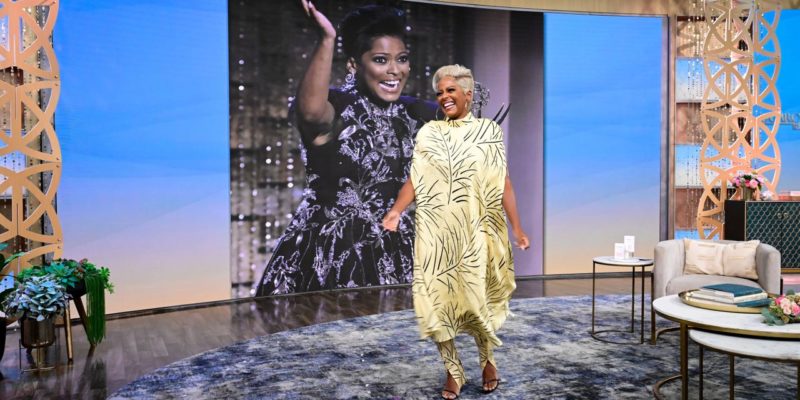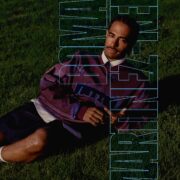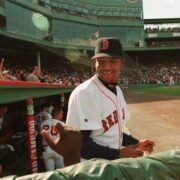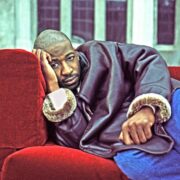I Run This is a weekly interview series that highlights Black women and femmes who do dope shit in entertainment and culture while creating visibility, access and empowerment for those who look like them. Read my Nicole Beharie interview here.
Tamron Hall isn’t new to this, she’s true to this. The veteran journalist’s daytime television show “Tamron Hall” is back for its fourth season. And with her vibrant, new hair color and a new Emmy to match, Hall has playfully dubbed her show’s newest season “The Golden Hour.”
“I felt like we’d come to a point where this one hour together with the Tam Fam that’s grown beyond anything I could have imagined has become this golden hour where we can talk about life, we can inspire each other, we can learn together, laugh together, sometimes cry together. It’s that hour that’s special,” Hall told HuffPost. “Much like in nature, the golden hour is when the sun shines so beautifully on your skin, and you get your selfies and they’re popping, and you’re putting them on the ’gram, that’s that feeling.”
As the only veteran Black television host, who is also the executive producer of her show, she holds a special place in the daytime TV canon. It’s especially true as her legacy helps usher in a new wave of Black hosts in daytime TV, including singer and actor Jennifer Hudson, actor Sherri Shepherd and reality TV personality Karamo Brown — whose shows all premiere this fall.
It’s a testament to the uniqueness she’s embodied throughout her 30-year-long career. Originally from Luling, Texas, Hall has broken down barriers for broadcast journalists to more freely express themselves and find their voices on air, especially for Black and female journalists. She’s overcome obstacles, including in 2017 when the “Today” show scrapped her and Al Roker’s hour to bring in Megyn Kelly. Hall said walking away from “Today” and deciding to bet on herself was a huge lesson that rendered the great reward of now having the No. 2 daytime television show.
Emphasizing the importance of connecting with her guests and more than 950,000 viewers on a real-life level, Hall is adamant about being an advocate for communities and stories that often go unheard. She also finds the balance to talk about trending news and topics in ways that bring more levity. This season includes stories about parents in Uvalde, Texas, sending their children back to school, interviews with the cast of “P-Valley” and conversations on how viewers can empower themselves to embrace the skin they’re in.
“The show really is about being with your friend at brunch, two mimosas in, and you can start with talking about the Queen of England and what this moment in history means, and then find yourself within 10 minutes talking about relationships and career. That’s what the show is,” the 51-year-old said.
Hall discusses her road to her latest roles as host and executive producer, the importance of betting on yourself, and how she makes her guests and viewers feel seen.
Congratulations on four seasons and getting renewed for a fifth season. How does it feel to be one of the main faces of daytime TV?
It feels wonderful. It feels incredible. I just did an interview with Edward Enninful, the first Black, first gay, first male editor in chief of Vogue UK, and we were talking, both off camera and on camera. His family immigrated to the U.K., and my grandfather was a sharecropper with a second-grade education. It speaks to I hope… hard work, determination, a reality of what we face as people of color, as Black people, as women, and not being deterred by those obstacles.
It’s been rewarding, and the journey continues. I never imagined this career, and I never imagined, certainly, being the host of a daytime talk show. It wasn’t a primary focus. But here we are, and I’m so elated to have defied the odds. When you defy odds, what does that mean? And how do you continue to defy the odds and inspire, hopefully, other people to feel the same way?
And for me, that’s been a big focus. Women over 40 or Black students, often say that the pipeline does not include them. That’s why I took the position with the National Association of Broadcasters (NAB). Now, being in this executive position, being the executive producer of my show, I was able to see firsthand that the pipeline does not always include the best and the brightest. They don’t always, even in this day and age, know that there’s an opportunity to produce for the “Tamron Hall” show. So, that’s a part of this next act for me.
And speaking of that, because you are the only veteran Black television host who is also the executive producer of her show, what does that mean to you? What weight does that carry?
Early on, it required me to take a lot of criticism that I didn’t believe was accurate. There were decisions that I had to make from a production standpoint to ensure the show was worth the time of the Tam Fam, and worth the time of the viewers. When you’re an executive producer and you make those decisions, and when you are a woman — when you are a Black woman, I believe sometimes I was not seen as a business person, or an executive producer making a decision. And people would come to me and say, “Wow, I thought Season 1 was good, but Season 2 is great.”
And so, here we were getting Emmy nominations, NAACP nominations, and Gracie Awards and nominations, and then you win. And those are the result of making decisions to make sure the product was the best show that we could put on for the audience. This is valuable time, and for people to spend an hour with you, I recognize, and my team certainly recognizes, that we could not take that for granted. I think that’s why we were able to get two seasons of a pickup, and that’s why I’m lucky enough to be talking to you.
You have always had such a loyal following. I even remember vividly when the controversy happened with the “Today” show. It’s been five years since that. What did that moment and the time that’s passed teach you about, not only knowing your worth and following your path but also how to maneuver in this business at that level?
In my personal life, I’ve told people more than ever it reminded me of betting on yourself. My mother bet on herself as a 19-year-old single mom to get out of a relationship that was not serving her well, or her child. She bet on herself and went on to achieve the goals that she put in front of her. And for me, it’s a reminder of what it means to bet on yourself. And it’s frightening. It can be, I should say. Some people said to me, “Oh, that was so courageous.” I do not believe that it was a moment of courage for me. I had no choice. My back, as they say, was against the wall.
But instead of courage, I replaced that with what we hope we can all do at any time, which is to believe and bet on ourselves. That’s what I tell my nieces and nephew, that’s what I will tell Moses, that’s what I tell the many young people that I mentor. That’s my message even now, being part of NAB, it’s betting on yourself in this industry. And recognizing that while we are journalists, it’s a business. I think that that was something I learned later in life, particularly around that “Today” show time period. I recognized that someone was not making a decision about journalism, they were making a decision about business, and thus I had to do the same.
Yeah. It’s so unfortunate how those business decisions can lead to casualties of good journalism.
Well, it depends. It’s unfortunate, but in reality, that’s a reminder of something that a journalist told me many, many years ago. She was an older woman, an anchor that I greatly admired. She said, “Tamron, this business quits you or you quit it.”
I think that it is unfortunate, but it’s reality. We hear this all the time. When I grew up, we lived near a couple of factories. And you hear about the pink slips being given out to the everyday man and woman who were going in and punching in the clock. So, it’s not unique to us, it’s not unique to this industry. What it is is a reminder of no matter what you do, for me, the lesson was the power of betting on yourself. And that applies to relationships, too.
That’s what we talk about on our show. A big component of the daytime world that was important to me was coming in and talking to people about the things they talk about. While we do news, we do a lot of shows on relationships. And just what I told you about betting on myself professionally is what I said even in life and dating. Bet on yourself, because you might need to leave that situation. And we talk about that on the show, and that’s why it’s so fun.
I love that. I even think about the clip that’s going viral right now with J. Alphonse Nicholson from “P-Valley.” It’s just such a touching moment.
What was also remarkable is that that was the very first time he was ever on a daytime show. The entire cast, I believe, was the very first time they’ve been on a major network show. Five million people watched the season premiere, the highest jump in the history of that network that they are on, Starz. And this was and is a proud moment for my staff for many reasons. But most of which revolved around the fact that, in daytime television, you would not normally have seen that cast, even with their great success, on a mainstream show.
That’s why I tweeted out the nerve of the Tamron Hall show to have the cast of “P-Valley” on. Because it did take a lot of nerve, and that’s a part of why I believe he was so emotional because this show is a juggernaut. It has such a loyal following of people, millions. But there are those in the traditional, mainstream world who would never think of them as contenders in any form.
You really see the folks that you interview. And even from that interview, that cast, J. Alphonse Nicholson felt seen. I’m wondering, what’s in your interviewer’s toolkit to ensure that the folks that you are talking to feel that, and can tap into that vulnerability?
I think because it is a show based on my perspective and the perspective of my team, so much of what we do is personal. I have felt unseen. I’ve been in this business for 30 years, and when I left the “Today” show, some of the job offers that were coming to me were almost intern status. And that’s not a knock on interns, because I was an intern. But after 30 years of being in the business, winning an Edward R. Murrow Award, being nominated for Emmys, and having highly rated shows, it was surreal. I didn’t see it as an ego trip. I saw it as anyone would see it looking at their resume and presenting their value to the marketplace.
So, I was able to, thankfully, in this world, as LeBron said, take my talents somewhere else. And luckily, ABC Disney recognized that there could be a show here, and developed this show with me, and Hearst, a major supporter of the show as well, putting it in prime spots on their stations throughout the country. That was a game-changer for me. So, for me, it’s emotional, it’s personal, and that’s why I approached the interviews that way. Going back to Edward Enninful, the title of his book is “Visible Man.” I’ve been in a position where I have not been seen, and I’ve been in positions where I have been seen.
And it’s important for me when I’m interviewing someone. We just had Casey Hammer on, and it was such a huge compliment for her to leave and her team doubled back to say, “No offense to anyone else, but that was the best interview that we’ve had with her.” Because I did want to see her, and I didn’t want it to be a clickbait, and I didn’t want it to be a moment where I didn’t recognize the trauma she says she’s felt generationally in this wealthy family who, she believes, were able to buy their way out of things that many would be behind bars for, according to her.
I would be so remiss not to ask you about your new hair color. It is so vibrant and it’s so you. What inspired your new hair color?
We call this season “The Golden Hour,” [which is a reference to] obviously Jill Scott, “living my life like it’s golden.” And I felt like we’d come to a point where this one hour together with the Tam Fam that’s grown beyond anything I could have imagined has become this golden hour where we can talk about life, we can inspire each other, we can learn together, laugh together, sometimes cry together. It’s that hour that’s special. Much like in nature, the golden hour is when the sun shines so beautifully on your skin, and you get your selfies and they’re popping, and you’re putting them on the ’gram, that’s that feeling.
I want it to embody the golden hour, so I called my hair stylist, Johnny Wright, who’s been my hair stylist for … he’s 45 since he was 20. But he, of course, was Michelle Obama’s hair stylist for eight years at the White House. The White House portrait that just was revealed [of Obama], he is the person behind the hair for the beautiful official portrait. But I said, “OK, let’s do it.” And he just took it away, and here we are.
Johnny did that, and you are rocking it.
I will tell him. So, it’s been fun. I wanted to embody the spirit of the hour. And being a journalist for 30 years, and an anchor for much of that time, I was never able to change my hair color. When I cut my hair short, I thought I was going to get fired. That’s how strident and regimented some news directors can be about the look, what an anchor looks like. And we also know that means race sometimes. Back when I started, an anchorwoman was usually a white female, blonde, sometimes brunette depending on the market, and that perfect bob, or really long hair. I never looked like the traditional anchor when I got into the business, but I was able to break down that barrier.
I had short hair, which was absolutely something that was not common at that time. But lucky enough, I ended up in Chicago where it was embraced, I think largely because of the makeup of the city of Chicago, in that it was a great market to be in to be able to have that individuality. Then when I came to the network news, I grew it out a little bit because I started getting that kind of feedback, or that, “We think your hair should be longer.” So this was liberating on two fronts, being the name and the executive producer who created my own show, I’ve got to do my hair the way I want. And it also embodied the spirit of what I want people to truly feel when they watch our show. I want them to feel seen, I want them to feel heard and respected, and cared for in that hour. And have fun.

What is your vision for the future of this show?
I think that we have found a unique lane. That doesn’t mean we are confined to this lane, but I think living in this lane of news and entertainment and life is so enjoyable. It means we will never run out of show ideas and topics. This is a life show, as I said, that’s one of our promos, and I mean that. And as long as we keep that focus, the show will live. And that’s important. I have ideas, of course, my team comes in, and we meet every day. That said, the best ideas that come in are from the conversations I have with my friends, with my family, with people who walk up to me and say, “you should do a show on this,” or “this happened.”
We did a medical gaslighting show inspired by an article I read in the Los Angeles Times about the number of women of color, and women in general, who go into the doctor’s offices and are ignored. I also saw one in HuffPost. I came back to my team, and I said, “This is a show we need to do on daytime television.” No one had done it, and we did it, one of our highest-rated shows. Flooded with emails, and posts, and comments on our social media from women from all backgrounds who’ve gone through the same thing. As long as we keep doing that, I believe we will be fine. Because no one else had done that show. And it was inspired not by me, but by you, by people who were out there talking about it. And we simply brought it to life, where so many women are watching TV, which still is daytime television.
Absolutely. What haven’t you done yet that you hope to accomplish before it’s all said and done?
For me, I think it’s more about building a show that recognizes, not me, what my team has done. I’m not an international superstar. I’m a journalist. And most of my team is comprised of journalists. But I believe that one of the things that people don’t know, or realize, is how successful the work that they’ve done is.
We’ve exceeded expectations with a show that is really centered around news, real life, and with a human interest tone. And I applaud them for it, because it is not an easy lift to do this type of daytime show, and it’s not for everybody. That’s why we’ve been so deliberate in the producers that we have because it is not a plug-and-play show. And because they have taken on this really difficult challenge in daytime TV, the audience has rewarded us with phenomenal ratings and growth.
What do you want your legacy to be?
Gosh, that’s a big question. I think that’s an impossible question to answer, for me. I hope that, certainly, it includes, one, that I want my son to know about me, which is I bet on myself. And life wasn’t easy, but I hope I did it with grace. I hope I did it in a way that makes the people who believe in me, whether it’s my family or my Tam Family, proud.











Comments